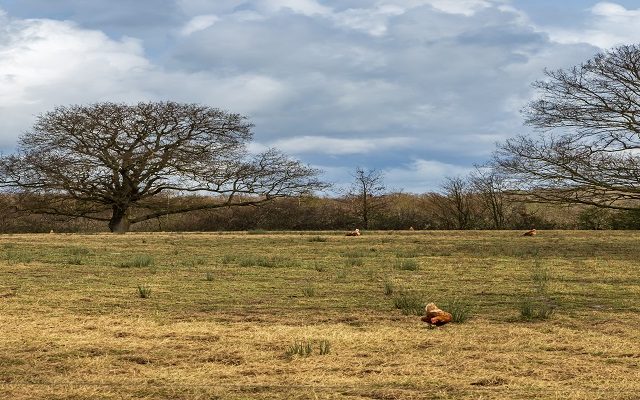Land Business Update | Week Commencing 17th April 2023
FARMING AND THE ENVIRONMENT
Grant for more efficient use of water for irrigation opening soon
The second round of the Water Management Grant will be opening for applications later this month. Grants will be available for capital items which allow for more efficient use of water for irrigation and construction of on-farm reservoirs. For example, the grant can fund the construction of reservoir walls, pump-houses, water meters, irrigation equipment such as boom or sprinklers, and equipment to monitor soil moisture levels and schedule irrigation. The minimum grant available is £35,000 and it is capped at £500,000, covering up to 40% of eligible costs. There are a few changes from the last round, such as requiring planning permissions and abstraction licences before full applications are submitted. If you have any questions or would like help with making an application, please contact Marie Charles.
Powering Up Britain day (or what was previously called Green Day) – further (leaked) news
Defra policies that aim to deliver 85% of the department’s proposed greenhouse gas emissions savings have been assessed, by the department itself, as being amber or red in terms of “delivery risk” and “delivery confidence”. Only 5 out of 44 policies were marked as green, so having low delivery risk and high delivery confidence; however, two of the green-rated policies were removed from the published carbon budget delivery plan. Defra, and the land use sector, has been repeatedly warned, by a range of organisations, that it is failing to deliver its environmental policies. For example, Defra has been asked by the Climate Change Committee to produce a plan for decarbonising farming for over five years and has not done so. NB Don’t forget that the High Court ruled the government’s initial Net Zero Strategy, published nine months’ ago, to be inadequate and unlawful.
Competition and Markets Authority consultation and WWF’s Retailers’ commitment for nature–climate action
This more positive story has obvious links to the one above. The Competition and Markets Authority (CMA) is consulting on whether competition rules can and should be amended to allow collaboration between businesses to increase environmental sustainability. The consultation follows the signing of the WWF’s Retailers’ commitment for nature–climate action, signed by many large retailers in 2022, which requires them to halve environmental impacts in their supply chains by 2030. S&P comment: given the government’s continued failure to meet its own environmental targets, it feels like actions set by individual businesses, the private sector and supply chains are going to have a significant role.
Environment Agency report questions Red Tractor Scheme
An investigation by the Environment Agency (EA) found that 26% of farms it inspected that were members of the Red Tractor scheme did not comply with environment regulations, compared to 19% of farms that are not members. The evidence is based on over 3,000 inspections carried out between 2014 and 2019. The lower compliance happens in nearly every sector, including dairy, beef, pigs, poultry and arable; the exceptions are horticulture and fruit and vegetables. In one example given in The Times, the EA estimates that 50% of dairy farms had inadequate slurry storage but a ‘very low percentage’ of Red Tractor members were instructed by Red Tractor to improve slurry storage. Commentators have called the report damning. Professor Sir Dieter Helm said it was a further reason for not relying on voluntary industry-led schemes and called for greater reliance on statutory regulation. The Environment Agency had been considering using Red Tractor inspections as a form of “earned recognition” status in place of separate inspections but has dropped the idea. An environmental charity, River Action, is considering whether to make a formal complaint about the validity of Red Tractor’s claims about its environment standards.
Countryside Stewardship application reminders
Applications for a Higher Tier agreement must be submitted by 28th April. Mid-Tier applications can be submitted until 18th August. Contact our farming team if you would like to discuss or make an application.
ENVIRONMENT
Plan for Water
Defra has published its plan to clean up the water environment, create a sustainable water supply and on how the water system will be managed in the future. It has been met with almost universal criticism – as inadequate and a rehash of policies that have previously failed. The Plan commits to £1.6bn of investment to stop 10,000 sewage discharges per year; while this sounds impressive, it represents just 3% of the current 300,000 discharges. It proposes to give regulators the power to impose unlimited fines on water companies; however, Ofwat can already impose fines of up to 10% of turnover and has only done so once in the past 30 years. It also proposes to ban wet wipes from containing plastic; this is the third time in five years the government has said it would ban it. The Times, which is running a ‘Clean it up’ campaign, says that £50bn of investment is needed to upgrade the sewage network. For land use, there are no new commitments but the following funding is available: the first round of the Slurry Infrastructure Grant and the second round of the Water Management Grant (see the lead article).
Property and rural economy
Consultation on letting holiday homes in England
The government is consulting on whether councils in England should be able to require planning permission for a change of use before houses can be let as holiday homes in areas which do not have enough affordable housing to rent or buy. The aim of the policy is to rebalance housing markets between the needs of local communities and the tourism industry. The government expects the changes to take effect by the end of this year, through the Levelling Up and Regeneration Bill. The government is also consulting on mandatory registration of holiday lets, so that councils have better data to monitor levels. Both Scotland and Wales are already consulting on and proposing policies on second home ownership and use – see our Land Business Tracker of new legislation and regulation.
‘Stick’ of house building targets removed from councils but no ‘carrots’ provided
The government has dropped its target of building 300,000 houses a year and also the requirement for a rolling five-year supply of land due to a rebellion by Conservative MPs. 30 councils had already dropped building targets before the announcement and a further 20 have done so since. The 300,000 target had not been achieved in any year since it was set although building rates had increased so that more than 200,000 houses had been built in each of the past six years. Dropping the target is likely to lead to fewer houses being built which, with higher mortgage rates and the end of the Help to Buy scheme, is expected to lead to house price rises. The Centre for Cities estimates that, compared with other European countries, Britain is short of 4.3 million homes.
Wireless Infrastructure Strategy for the UK
This newly launched strategy aims to deliver nationwide coverage of standalone 5G to all populated areas by 2030. It includes some funding for properties that can’t connect to the 5G network to connect to the satellite network (although the monthly charges are still much higher than standard 5G costs).






